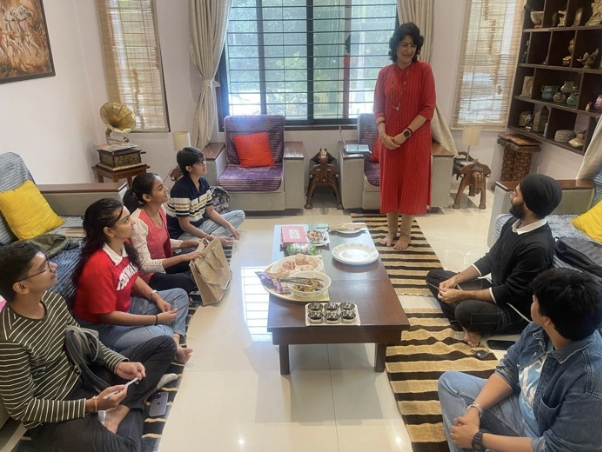
Students preparing for the Fukushima Socio-Industrial Experience Program participated in a Pre-Japan Immersion Program led by NSBT with insights from F-ATRAs focussing on Japanese culture, business etiquette, and Indo-Japanese relations.
Note: This content belongs to a 5-part report about the Fukushima Socio-Industrial Experience Program sponsored by Fukushima Innovation Coast Framework (FIPO) and conducted by F-ATRAs (Futaba Area Tourism Research Association) in January, 2025.
As preparation for the Fukushima Socio-Industrial Experience Program, the students took part in a Pre-Japan Immersion Program spearheaded by Nath School of Business and Technology (NSBT) with inputs from Futaba Area Tourism and Research Association (F-ATRAs). The program combined sessions on Japanese etiquette and business consciousness combined with lectures on present-day Fukushima to prepare participants for their Japanese experience.
The program unfolded across three intensive sessions spanning October to November 2024. The first session, conducted on October 6, laid the foundational understanding of Japanese society. Participants delved into the nation’s core values of harmony and collectivism, with special attention given to the Fukushima region’s inspiring journey of resilience and renewal following the 2011 disaster.
The second session on October 20 took a practical turn, focusing on essential behavioral protocols and language skills. Participants learned the art of proper bowing, business card exchange, and crucial Japanese phrases for daily interactions. Through role-playing activities, they practiced common expressions like “Arigatou gozaimasu” and “Sumimasen,” building confidence in their ability to navigate basic communications.
November 3 marked the final session, which addressed practical aspects of living in Japan. From mastering public transportation etiquette to understanding the convenience store culture, participants received comprehensive guidance on daily life scenarios. The session concluded with valuable travel tips and a thorough review of all topics covered.
To deepen their understanding of Indo-Japanese relations, participants engaged in a month-long study of “India and Japan: Past, Present and Future” by Rajaram Panda. This scholarly work provided crucial insights into the bilateral relationship between the two nations, exploring everything from security challenges in the Indo-Pacific region to the role of Asian values in fostering mutual understanding. The book’s examination of the Indian diaspora in Japan and joint development initiatives in India’s Northeast region offered participants a broader perspective on the evolving partnership between these Asian powers.
The program culminated in an enlightening online session with Shri. Ashok Kumar Chawla, Advisor – Japan, Ministry of External Affairs, on December 30, 2024. Chawla’s insights into lifetime employment practices and the importance of hierarchy in Japanese organizations provided participants with valuable knowledge for professional success in Japan. Right before departing for Japan, the students also had a chance to visit the Consulate General of Japan in Mumbai.
Through this carefully structured program, participants have been positioned to serve as effective cultural ambassadors, ready to contribute to the strengthening bonds between India and Japan while making the most of their immersive experience in Fukushima.
